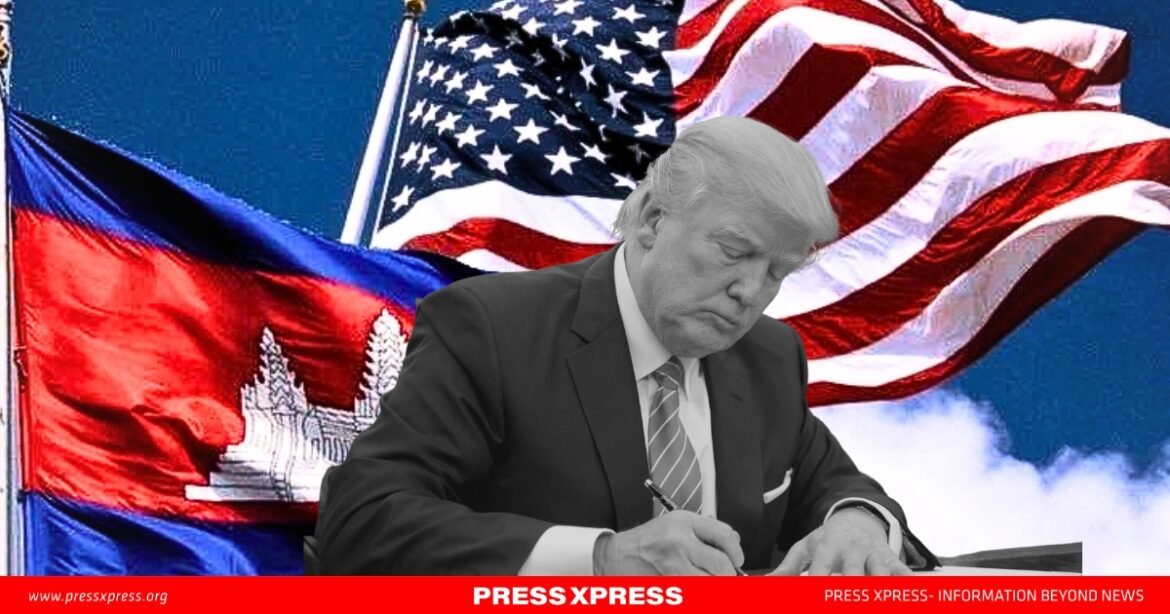As former U.S. President Donald Trump re-emerges on the global stage, Cambodia, like many smaller nations, is bracing for potential policy turbulence. Trump’s return to power — should it materialize — could bring renewed protectionist policies and a more unpredictable diplomatic tone. For Phnom Penh, this raises both concern and opportunity.
Trump’s earlier tenure was marked by hundreds of executive orders, including sharp tariff hikes and a transactional foreign policy that often alienated allies and unsettled smaller states. With little room for retaliation or negotiation, Cambodia must now consider proactive strategies to insulate itself from potential shocks.
Small State, High Stakes
Cambodia’s previous experience with the Trump administration was anything but smooth. The controversial deportation of Cambodian convicts — despite protests and legal concerns — served as a stark reminder that hesitation or resistance is often met with pressure, or worse, sanctions.
As a small state, Cambodia’s policy space is limited. Any move perceived as non-cooperative could draw punitive measures. But cooperation doesn’t mean submission — Cambodian officials say goodwill and pragmatic diplomacy are essential not only to protect national interests but also to rebuild trust with Washington.
Despite ongoing tensions, Cambodia has consistently expressed confusion over perceived hostility from the U.S. “Why does the American administration seem to hate us?” is a question often asked in government circles. Officials point out that the Cambodian People’s Party (CPP)-led government has never taken a hostile position toward Washington — not even during the Cold War, when Phnom Penh was branded a Soviet satellite.
Strained Perceptions
One flashpoint remains the U.S. government’s long-standing support for Voice of America (VOA) and Radio Free Asia (RFA), both of which are often perceived by Cambodian authorities as relentlessly critical. To many officials, these broadcasts paint an unfair and extreme image of the country — one that fuels political polarization and echoes the divisive rhetoric of the Khmer Rouge era.
There is also concern about ex-Khmer Rouge elements among the Cambodian diaspora in the United States, some of whom maintain radical anti-government views and allegedly encourage unrest.
While these narratives may appear exaggerated, they shape the mood of a government seeking recognition, not rejection, from its Western counterparts.
Acts of Goodwill, Forgotten Quickly
Cambodia’s frustration is compounded by what it sees as overlooked gestures of goodwill. In 2020, at the height of the COVID-19 pandemic, Phnom Penh allowed the Westerdam cruise ship — turned away by multiple countries — to dock in Sihanoukville. The move was widely praised for its humanity, and then-President Trump personally tweeted thanks, calling Cambodia “a beautiful country” and promising the U.S. would remember the gesture.
That goodwill, however, quickly faded as bilateral tensions resumed. With another Trump presidency possible, Cambodia is once again preparing for a complex diplomatic climate — and officials are exploring ways to stay ahead of the curve.
A Strategic Policy Toolbox
In anticipation of shifting dynamics with a potential new U.S. administration, Cambodia is quietly formulating a set of strategic responses aimed at preserving its autonomy while signaling cooperation. One idea under discussion is offering a unilateral visa exemption for American tourists on a trial basis. Such a move would not only promote goodwill but could also further boost U.S. tourist numbers, which already top Western arrivals, with Americans leading visits to major heritage sites like Angkor Wat.
On the sensitive issue of deportations, Cambodian officials are considering adopting a more constructive and compassionate approach, working within the country’s capacity to receive returnees and thus avoiding the diplomatic standoffs of the past. In the security sphere, Cambodia may also push for a rapid resumption of joint military exercises — building on previous defense cooperation as a gesture of restored trust.
The Ream Naval Base, often the subject of geopolitical speculation, could be reframed as a center for international cooperation. Cambodia might invite the United States or allies like Australia to resume English language training or launch new exchange programs there, shifting the focus from suspicion to collaboration. At the same time, attention is turning to maritime security, with calls for greater U.S. and regional support in building the capacity of Cambodia’s coast guard to combat piracy, illegal fishing, and environmental degradation. Concerns have mounted over reports of large-scale, foreign-led night fishing operations that threaten the sustainability of the country’s marine ecosystems.
Domestically, the Cambodian government is encouraging local business conglomerates to invest in offshore fisheries. At present, most of the country’s marine industry remains in the hands of traditional, small-scale operators, while foreign vessels dominate commercial fishing — often with minimal benefit to Cambodia’s economy or coastal communities.
Economic diplomacy is also being considered. Cambodian trade officials are exploring the possibility of reducing tariffs on selected American goods, particularly in sectors that pose no threat to key domestic industries such as agriculture. As a further step, Cambodia — currently serving as the ASEAN-U.S. dialogue coordinator — could propose a special meeting between ASEAN foreign ministers and their American counterparts, inviting trade ministers as well, to identify gaps in existing policies and shape a more mutually beneficial framework for cooperation.
A Delicate Balancing Act
These proposals are not intended to placate, but to protect. For a small state navigating an increasingly complex world, such gestures represent a strategic blend of pragmatism, sovereignty, and diplomatic foresight. Cambodia is not aiming to pick sides in global power struggles, but to define its own space with maturity and initiative.
As the prospect of a second Trump presidency looms, Phnom Penh’s best defense may lie not in resistance, but in proactive diplomacy — designed to foster stability, avoid unnecessary confrontation, and secure its place in an unpredictable world order


